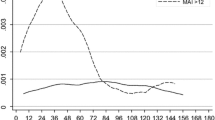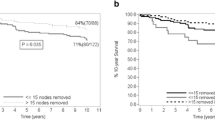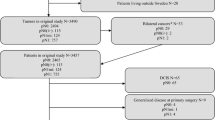Abstract
We evaluated the relationship between the DNA ploidy status and other variable prognostic factors, especially regional lymph node metastases, in 121 patients with invasive ductal carcinoma of breast, together with the value of these factors in estimating the prognosis of breast cancer. The ploidy status was diploid in 40% of the patients, and aneuploid in 60%. A significantly higher incidence of aneuploidy was found in patients with more than 4 positive axillary lymph nodes, positive internal mammary lymph nodes, or clinical stage 3 of malignancy. In a univariate study, overall survival and disease-free survival were significantly correlated with axillary and internal mammary lymph node metastases, tumor size, and clinical stage of malignancy. The disease-free survival rates for the diploid group tended to be somewhat higher than those for the aneuploid group of patients without axillary lymph node metastases. In the multivariate analysis, however, only axillary lymph node metastasis was significantly correlated with overall survival and disease-free survival. There was also a trend for the internal mammary lymph node metastases to be correlated with survival. As the DNA ploidy status was closely correlated with the axillary and internal mammary lymph node metastases, it did not appear to be an independent prognostic factor in this small series.
Similar content being viewed by others

References
Nemoto T, Vana J, Bedwani R, Baker H, McGregor F, Murphy G: Management and survival of female breast cancer: results of a national survey by the American College of Surgeons. Cancer 45: 2917–2924, 1980
Veronesi U, Cascinelli N, Greco M, Bufalino R, Morabito A, Galluzzo D, Conti R, Lellis RD, Donne VD, Piotti P, Sacchini V, Clemente C, Salvadori B: Prognosis of breast cancer patients after mastectomy and dissection of internal mammary nodes. Ann Surg 202: 702–707, 1985
National Cancer Institute: Clinical alert from the National Cancer Institute, May 16, 1988. Breast Cancer Res Treat 12: 3–5, 1988
McGuire WL, Dressler LG: Emerging impact of flow cytometry in predicting recurrence and survival in breast cancer patients. JNCI 75: 405–410, 1985
Kute TE, Muss HB, Anderson D, Crumb K, Miller B, Burns D, Dube LA: Relationship of steroid receptor, cell kinetics, and clinical status in patients with breast cancer. Cancer Res 41: 3524–3529, 1981
Cornelisse CJ, van de Velde CJH, Caspers RJC, Moolenaar AJ, Hermans J: DNA ploidy and survival in breast cancer patients. Cytometry 8: 225–234, 1987
Kallioniemi OP, Blanco G, Alavaikko Met al. Tumour DNA ploidy as an independent prognostic factor in breast cancer. Br J Cancer 56: 637–642, 1987
Hedley DW, Rugg CA, Alun BP, Taylor IW: Influence of cellular DNA content on disease-free survival of stage II breast cancer patients. Cancer Res 44: 5395–5398, 1984
Fossa SD, Thorud E, Shoaib MC, Pettersen EO, Hoie J, Scott Knudsen O: DNA flow cytometry in primary breast carcinoma. Acta Path Microbiol Immunol Scand Sect A 92: 475–480, 1984
Jakobsen A, Skovgaard-Poulsen H, Lindegaard Madsen E, Ellebaeck Petersen S, Sommer Hansen H: Ploidy level of human breast carcinoma. Acta Radiol Oncol 23: 103–107, 1984
Uyterlinde AM, Schipper NW, Baak JPA: Comparison of extent of disease and morphometric and DNA flow cytometric prognostic factors in invasive ductal breast cancer. J Clin Pathol 40: 1432–1436, 1987
Deshpande N, Mitchell I, Allen D, Morris R: Deoxyribonucleic acid (DNA) content of carcinomas and prognosis in human breast cancer. Int J Cancer 32: 693–696, 1983
Ewers SB, Langstrom E, Baldetorp B, Killander D: Flowcytometric DNA analysis in primary breast carcinomas and clinicopathological correlations. Cytometry 5: 408–419, 1984
Moran RE, Black M, Alpert L, Strauss MJ: Correlation of cell-cycle kinetics, hormone receptors, histopathology, and nodal status in human breast cancer. Cancer 54: 1586–1590, 1984
World Health Organization. The World Health Organization histological typing of breast tumors, second edition. Am J Clin Pathol 78: 806–816, 1982
Schutte B, Reynders MMJ, Bosman FT, Blijham GH: Flow cytometric determination of DNA ploidy level in nuclei isolated from paraffin-embedded tissue. Cytometry 6: 26–30, 1985
Hedley DW, Friedlander ML, Taylor IW, Rugg CA, Musgrove EA: Method for analysis of cellular DNA content of paraffin-embedded pathological material using flow cytometry. J Histochem Cytochem 31: 1333–1335, 1983
Vindelov LL, Christensen IJ, Nissen NI: A detergent trypsin method for the preparation of nuclei for flow cytometric DNA analysis. Cytometry 3: 323–327, 1983
Japan Breast Cancer Society: General rule for clinical and pathological record of breast cancer, 9th edition. Kinbara Co, Tokyo, 1988
Consensus Conference: Adjuvant chemotherapy for breast cancer. JAMA 254: 3461, 1985
McGuire W: Adjuvant therapy of node-negative breast cancer. N Engl J Med 8: 525–527, 1989
De Vita V: Breast cancer therapy: exercising all our options. N Engl J Med 8: 527–529, 1989
Beerman H, Kluin PM, Hermans J, van de Velde CJH, Cornelisse CJ: Prognostic significance of DNA-ploidy in a series of 690 primary breast cancer patients. Int J Cancer 45: 34–39, 1990
Fisher B: The revolution in breast cancer surgery: science or anecdotalism? World J Surg 9: 655–666, 1985
Lewis WE: Prognostic significance of flow cytometric DNA analysis in node-negative breast cancer patients. Cancer 65: 2315–2320, 1990
Winchester DJ, Duba RB, August CZ, Goldschmidt RA, Wruck DM, Rademaker AW, Winchester DP, Merkel DE: The importance of DNA flow cytometry in node-negative breast cancer. Arch Surg 125: 886–889, 1990
Clark GM, Dressler LG, Owens MA, Pounds G, Oldaker T, McGuire WL: Prediction of relapse or survival in patients with node-negative breast cancer by DNA flow cytometry. N Engl J Med 320: 627–633, 1989
Ewers SB, Baldetorp B, Killander D, Langstrom E: Flow cytometry DNA ploidy and number of cell populations in the primary breast cancer and their correlation to the prognosis. Acta Oncologica 28: 913–918, 1989
Keyhani-Rofagha S, O'Toole RV, Farrar WB, Sickle-Santanello B, DeCenzo J, Young D: Is DNA ploidy an independent prognostic indicator in infiltrative node-negative breast adenocarcinoma? Cancer 65: 1577–1582, 1990
Sigurdsson H, Baldetorp B, Borg A, Dalberg M, Ferno M, Killander D, Olsson H: Indicators of prognosis in nodenegative breast cancer. N Engl J Med 322: 1045–1053, 1990
Wynder EL, Kajitani T, Kuno K, Lucas JC, Palo AD, Farro JA: Comparison of survival rates between American and Japanese patients with breast cancer. Surg Gynecol Obstet 117: 196–200, 1963
Nemoto T, Tominaga T, Chamberlain A, Iwasa Z, Koyama H, Hama H, Bross I, Dao T: Differences in breast cancer between Japan and the United States. JNCI 58: 193–197, 1977
Morrison AS, Black MM, Lowe CR, MacMahon B, Yuasa S: Some international differences in histology and survival in breast cancer. Int J Cancer 11: 261–267, 1973
Sakamoto G, Sugano H, Hartmann WH: Comparative clinico-pathological study of breast cancer among Japanese and American females. Jap J Cancer Clin 25 (3): 161–170, 1979
Koike H: The impact of DNA ploidy and proliferative index on survival of breast cancer patients. Mie Medical Journal 38 (2): 111–124, 1988
Author information
Authors and Affiliations
Rights and permissions
About this article
Cite this article
Noguchi, M., Taniya, T., Ohta, N. et al. Lymph node metastases versus DNA ploidy as prognostic factors for invasive ductal carcinoma of the breast. Breast Cancer Res Tr 19, 23–31 (1991). https://doi.org/10.1007/BF01975201
Issue Date:
DOI: https://doi.org/10.1007/BF01975201



